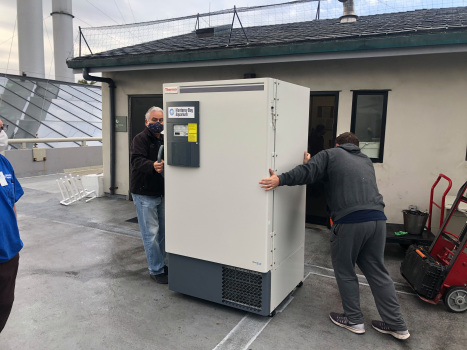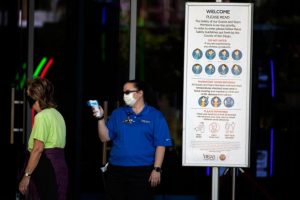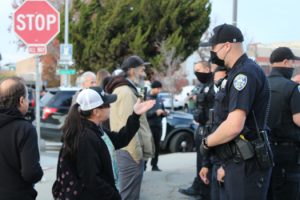Crews move the Monterey Bay Aquarium’s ultra-cold freezer from the aquarium to Natividad Medical Center to provide critical storage of the Pfizer vaccine. (Courtesy Natividad Medical Center)
MONTEREY — Lacking the equipment needed to keep doses of a COVID-19 vaccine at the correct temperature, Natividad Medical Center has partnered with the Monterey Bay Aquarium to use one of its deep freeze units until one the hospital has ordered arrives.
The Pfizer-BioNTech vaccine must be stored at a chilly 70 degrees below zero Celsius, or minus 94 Fahrenheit. The aquarium’s ultra-cold freezer — one of two it owns — can reach temperatures down to minus 86 C (-123 F), plenty cold to keep the vaccine viable. By comparison, if you stood atop Mt. Everest in winter, the average temperature would be a far warmer -37 C (-34.6 F).
The other vaccine being shipped, made by Moderna, needs to be kept at -20 C (-4 F). The Moderna product can be stored in a standard freezer. The Moderna vaccine received Food and Drug Administration approval after Pfizer.
Natividad has an ultra-cold freezer on backorder but it won’t arrive until late January. Many hospitals across the nation opted not to purchase the specialized freezers needed to store the Pfizer vaccine, which can cost $5,000 to $15,000. Natividad Foundation, the nonprofit that works to support Natividad, purchased the freezer with its donors’ financial support.
The remaining freezer at the aquarium is enough for its uses. Ken Peterson, a senior communications specialist with the aquarium, said it’s typically used to store archived serum and plasma from sea otters the aquarium has handled through its sea otter program, both with exhibit animals and wild sea otters.
“We’re glad the aquarium can help in an unexpected way to control COVID-19 in Monterey County,” said aquarium veterinarian Dr. Mike Murray in a press release. “Ultra-cold freezers are in high demand across the country. We’re honored to provide this freezer to the hospital while waiting to take delivery on its own. It’s the perfect place to store the Pfizer vaccine.”
The first recipients of the vaccine include hospital staff members who work physically in high-risk clinical care areas, including environmental services, nurses, physicians and patient transport. Natividad serves a significant percentage of the county’s essential workers living in the Salinas Valley, making vaccine distribution especially critical.
“We planned to hold the vaccine on dry ice, but that would have been a lot of extra work,” said Natividad Assistant Administrator Andrea Rosenberg, who oversees operations for the hospital. “We are very grateful to the aquarium for our collaboration.”
It was luck that David Rosenberg, the vice president of guest experience at the aquarium, is married to Andrea Rosenberg. She let her husband know that Natividad’s ultra-cold freezer was on backorder and wouldn’t arrive till late January. Word made it down to Murray, the veterinarian, who knew about the aquarium’s freezers.
With that, Natividad put that problem on ice.



















